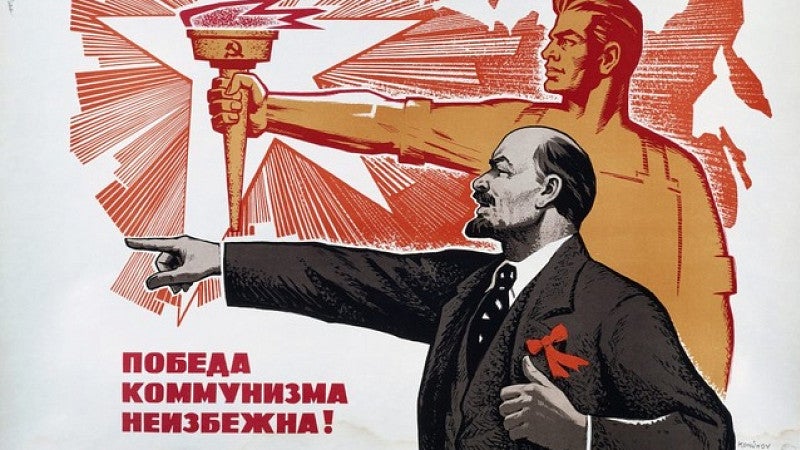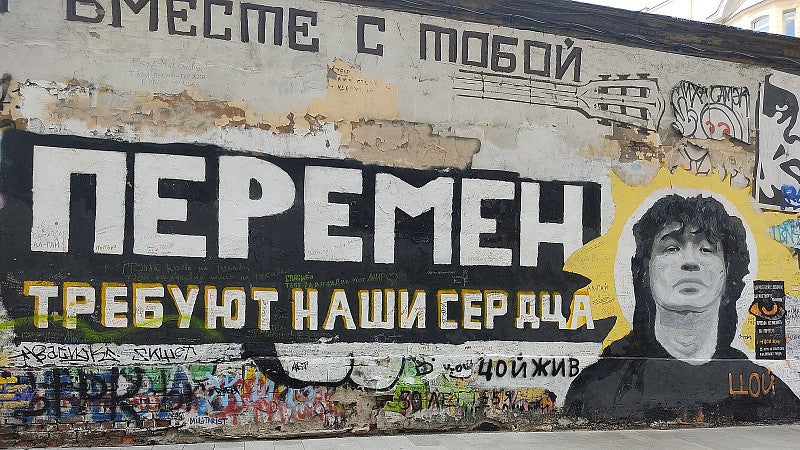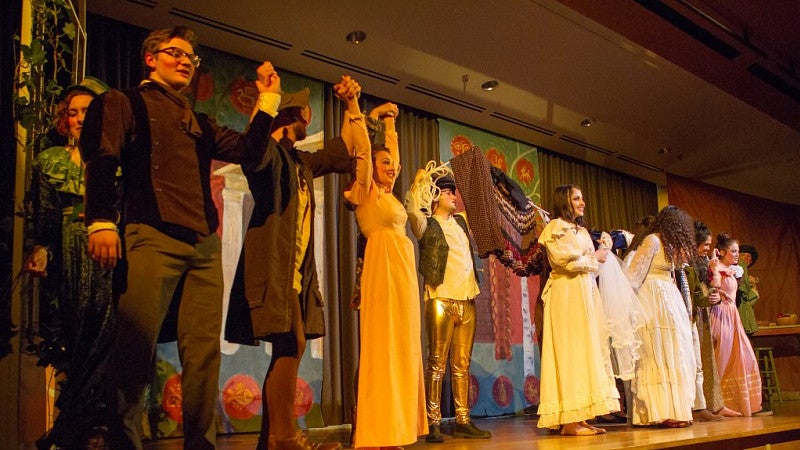Courses in REEES
The University of Oregon course catalog offers degree plans and a complete list of courses in the Russian, East European, and Eurasian Studies program.
Featured Courses

HIST 347 Soviet Union and Contemporary Russia
Instructor: Julie Hessler
Examines the rise, development, and collapse of the Soviet Union, the world's first communist regime. Topics include the Russian Revolution, Stalinism, war, culture, and society.

RUSS 206 Introduction to Russian Literature
Instructor: Susanna Lim
Survey of literature, films, and popular culture of the Soviet and post-Soviet periods; topics include literature by Bulgakov, Solzhenitsyn, Ukranian film, post-Soviet film, and rock music. Readings, lecture, and discussions in English.

RUSS 309 Russian through Theater
Instructor: Julia Nemirovskaya
Combined elements of Russian language, literature, and culture learned through participation in a theater production. Credits vary with degree of involvement.
Course Descriptions
Russian Language Courses
At the University of Oregon, we offer four years of Russian language study as well as specialized courses. Our advanced language courses are fun and engaging and focus on learning Russian through film and television, reading print media, and other methods.
Russian language study begins in sequence each fall, and beginning students should start with Russian 101. Students who have some experience with Russian or are heritage speakers should make arrangements to take a WebCAPE placement test in Russian with the UO Testing Center, the cost of which is $10. Upon receiving the results of the test, students should make arrangements to meet with Lara Ravitch at ravitch@uoregon.edu. Native speakers of Russian are not eligible for lower-level language classes but may take language classes at the 400 level.
If you have already begun your study of Russian and would like some additional resources to improve your knowledge of the language, you can also consult the Self-Study Russian Online Supplementary Guide that UO Slavic Librarian Heghine Hakobyan has compiled in collaboration with our graduate students. The guide contains flashcards, phrasebooks, and other helpful materials.
Below is the Russian language sequence:
| RUSS 101, 102, 103. First Year Russian Sequence. 5 Credits Each. Elementary Russian grammar, conversation, reading, and composition. |
| RUSS 201, 202, 203. Second Year Russian Sequence. 5 Credits Each. Intermediate Russian grammar, reading, conversation, and composition. Study of representative literary works. |
| RUSS 301, 302, 303. Third Year Russian Sequence. 5 Credits Each. Intermediate-to-advanced Russian. Further development of basic skills, with special attention to reading comprehension, conversational competence, grammatical accuracy, and cultural sophistication. |
| RUSS 436. Advanced Russian. 4 Credits. Analysis of Russian texts, films, and TV broadcasts about selected topics in Russian culture, literature, politics, and economics with practice in comprehension, conversation, and composition. Repeatable. |
Humanities Courses (Taught in English)
The following are Russian language, literature, and culture courses applicable to the humanities emphasis/field of concentration:
| RUSS 204. Introduction to Russian Literature. 4 Credits. Survey of Russian literature from its origins to the present; emphasis on Pushkin, Gogol, Turgenev, Dostoevsky, Tolstoy, Chekhov, and contemporary works. Readings, lectures, and discussions in English. |
| RUSS 205. Introduction to Russian Literature. 4 Credits. Survey of Russian literature from its origins to the present; emphasis on Pushkin, Gogol, Turgenev, Dostoevsky, Tolstoy, Chekhov, and contemporary works. Readings, lectures, and discussions in English. |
| RUSS 206. Introduction to Russian Literature. 4 Credits. Survey of Russian literature from its origins to the present; emphasis on Pushkin, Gogol, Turgenev, Dostoevsky, Tolstoy, Chekhov, and contemporary works. Readings, lectures, and discussions in English. |
| RUSS 240. Russian Culture. 4 Credits. Comparative aesthetics and development of art, film, architecture, music, and literature in the context of Russian intellectual history. Readings, lectures, and discussions in English. |
| RUSS 309. Russian through Theater. 2-4 Credits. Combined elements of Russian language, literature, and culture learned through participation in a theater production. Credits vary with degree of involvement. Repeatable up to three times for a total of 16 credits. |
| RUSS 331. Russian Short Story. 4 Credits. Analysis of short stories by important 19th and 20th century Russian writers in the context of social political and literary development. Readings in English. Offered alternate years. |
| RUSS 334. Dostoevsky. 4 Credits. Introduction to the novels and short stories of Dostoevsky. His literary, ethical, and political development. Readings and instruction in English. |
| RUSS 335. Tolstoy. 4 Credits. Examines short and long works by Leo Tolstoy, focusing on ethical questions and Tolstoy's literary art. Besides being a great writer, Tolstoy was also a philosopher, a religious thinker and a reformer. Readings and instruction In English. |
| RUSS 351. Russian Literature and Film. 4 Credits. Introduction to great works of 19th-century Russian literature and analysis of the cinematic adaptation of these works by Western filmmakers. |
| RUSS 399. Special Studies: [Topic]. 1-5 Credits. Recent topics are Solzhenitsyn, Sex and Feminism in Russia. Repeatable when topic changes. |
| RUSS 404. Internship: [Topic]. 1-12 Credits. Repeatable. |
| RUSS 407. Seminar: [Topic]. 2-4 Credits. Repeatable when topic changes. |
| RUSS 410. Experimental Course: [Topic]. 2-4 Credits. Recent topics are Self and Other in Russian Literature and Film. Repeatable when topic changes. |
| RUSS 403. Thesis. 3-6 Credits. Repeatable. |
| RUSS 405. Reading and Conference: [Topic]. 1-6 Credits. Repeatable. |
| RUSS 409. Practicum: [Topic]. 1-5 Credits. Repeatable. |
| RUSS 426. Classics of Russian Poetry: [Topic]. 4 Credits. Comprehensive study of selected topics in Russian poetry (e.g., Alexander Pushkin, Russian symbolism, acmeism, futurism, and contemporary poetry). Repeatable twice when topic changes for maximum of 12 credits. |
| RUSS 434. Russian Literature: [Topic]. 4 Credits. Comprehensive study of selected topics in Russian literature, (e.g., 20th-century, contemporary, and Old Russian literature). Repeatable twice when topic changes for maximum of 12 credits. |
| RUSS 436. Advanced Russian: [Topic]. 4 Credits. Analysis of Russian texts, films, and TV broadcasts about selected topics in Russian culture, literature, politics, and economics with practice in comprehension, conversation, and composition. Repeatable twice when topic changes for a maximum of 12 credits. Prereq: RUSS 318 or equivalent. |
| RUSS 604. Internship: [Topic]. 1-12 Credits. Repeatable. |
| HUM 300. Themes in the Humanities. 4 Credits. Interdisciplinary and multimedia introduction to the study of the humanities. Analysis of such themes as tragedy in music, literature, and art. Following HUM 300 topics applicable to REEES: "Tolstoy" |
| SCAN 351. Periods in Scandinavian Literature. 4 Credits. Possible topics are modern breakthrough and modernism in Scandinavian literature. Student discussion, oral presentations, and written papers. Readings and discussions in English. |
Social Science Courses (Taught in English)
The following are Russian and East European history, politics, and society courses applicable to the social science emphasis/field of concentration:
REEES Courses
| REES 199. Special Studies: [Topic]. 1-5 Credits. Repeatable. |
| REES 403. Thesis. 3-6 Credits. Repeatable. |
| REES 405. Reading and Conference: [Topic]. 1-5 Credits. Repeatable. |
| REES 407. Seminar: [Topic]. 2-4 Credits. Repeatable. |
| REES 410. Experimental Course: [Topic]. 2-6 Credits. Repeatable. |
History Courses
| HIST 290. Historian's Craft. 4 Credits. Gateway course to the History major. Explores the diverse meanings and methods of modern historical interpretation. Trains students to work with original historical sources and become more effective consumers and producers of historical writing, preparing them for upper-division coursework. Topic must be REEES-related to count toward a major or minor. |
| HIST 345. Early Russia. 4 Credits. Kievan Rus and Byzantium; Christianization; Mongol dominance; rise of Moscow and two Ivans, one Great, one Terrible; crisis of modernization and subsequent religious dissent. |
| HIST 346. Imperial Russia. 4 Credits. Siberian and North American expansion; Peter the Great; Catherine the Great; abolition of serfdom; industrialization; Silver Age culture and revolution; World War I and collapse. |
| HIST 347. Soviet Union and Contemporary Russia. 4 Credits. Examines the rise, development, and collapse of the Soviet Union, the world's first communist regime. Topics include the Russian Revolution, Stalinism, war, culture, and society. |
| HIST 407. Seminar: [Topic]. 5 Credits. Recent topics include History of Los Angeles, Modern Japanese Culture, Rethinking America in the 1960s, and Stalinism. Repeatable. Following topics applicable to REEES: "Sem Russia Tsars/People," "Sem WW I & Russian Revolutions," "Sem Stalinism," "Sem Postwar USSR," and "Sem USSR at War" |
| HIST 415. Advanced World History: [Topic]. 4 Credits. Advanced intensive study of selected issues in world history. Possible topics include biology and ecology, ancient empires, or intercultural encounters. Repeatable three times for a maximum of 16 credits when topic changes. Following topics applicable to REEES: "Top Russian & American," and "Top Energy and Politics" |
| HIST 428. Europe in the 20th Century: [Topic]. 4 Credits. War, revolution, social change, political transformation, and related intellectual and cultural developments in Europe from the Great War of 1914–18 through the present. I: European Fascism. II: Jews in Modern Europe. III: Eastern Europe since World War I. IV: Europe since 1945. Repeatable when chronological or thematic topic changes. Following topic applicable to REEES: "Top East Europe in 20th Century" |
| HIST 444. The Holocaust. 4 Credits. Surveys history of Nazi genocide, focusing on terror and complicity in formation of racial policy; and on perceptions of Nazi anti-Semitism as the Holocaust was occurring. |
| HIST 446. Modern Russia: [Topic]. 4 Credits. Explores topics such as the intellectual and cultural history of Russia from the revolution to recent times. Repeatable twice for a maximum of 12 credits. |
Geography Courses
| GEOG 202. Geography of Europe. 4 Credits. Physical and cultural processes that have shaped the rural and urban landscapes of Europe. |
| GEOG 441. Political Geography. 4 Credits. Spatial perspectives on global political patterns and processes. Relationship of political territories to resources, ethnic patterns, and ideological communities. Impact of political arrangements on landscapes. Prereq: Junior standing. |
Global Studies Courses
| GLBL 465. Global Reproductive Health. 4 Credits. Overview of issues in global reproductive health, including politics, economics, historical and cultural factors. Implications for international health and development programs reviewed. Offered alternate years. |
| GLBL 410. Experimental Course: [Topic]. 1-5 Credits. Repeatable. Only applicable to REEES when Topic is "Development and Conflict." Recent topics include Africa: Development and Social Change. Repeatable when topic changes. |
Judaic Studies Courses
| JDST 213. The Jewish Encounter with Modernity. 4 Credits. Survey of Jewish encounters with modernity outside the Americas from 1700 to 1948; concentrates on transformations in political status, national identity, Jewish culture, and religious self-definition. |
Political Science Courses
| PS 387. Russian Politics. 4 Credits. The course traces Russian politics from a communist regime to its current state, investigates contemporary aspects of Russian politics, and examines Russia's vision of the world and its foreign policy. |
| PS 433. Marxism and Radical Thought. 4 Credits. Surveys utopian socialist thought, anarchism, Marxism, and Leninism. Central themes include the nature of radical theory, the role of the state, human nature and the new society. |
| PS 455. Theories of International Politics. 4 Credits. Competing theories of international relations and strategies for testing the theories. |
| PS 475. Politics of the European Union. 4 Credits. Surveys the historical development and current workings of the European Union’s major institutions and policies. Offered alternate years. |
Religious Studies Courses
| REL 324. History of Eastern Christianity. 4 Credits. Byzantine Christianity from the founding of the Christian Roman Empire to the Fall of Constantinople in the 15th century. |
| REL 325. History of Eastern Christianity. 4 Credits. The Eastern churches from the 15th century to the present. |

